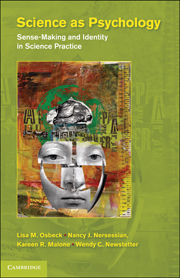Book contents
- Frontmatter
- Contents
- Acknowledgments
- 1 Introduction: Science and Persons
- 2 Methods of Study
- 3 The Problem-Solving Person
- 4 The Feeling Person
- 5 The Positioning Person
- 6 The Person Negotiating Cultural Identities
- 7 The Learning Person
- 8 Epilogue: Science as Psychology: A Tacit Tradition and Its Implications
- References
- Index
8 - Epilogue: Science as Psychology: A Tacit Tradition and Its Implications
Published online by Cambridge University Press: 05 July 2011
- Frontmatter
- Contents
- Acknowledgments
- 1 Introduction: Science and Persons
- 2 Methods of Study
- 3 The Problem-Solving Person
- 4 The Feeling Person
- 5 The Positioning Person
- 6 The Person Negotiating Cultural Identities
- 7 The Learning Person
- 8 Epilogue: Science as Psychology: A Tacit Tradition and Its Implications
- References
- Index
Summary
OVERVIEW OF FINDINGS
In this work we have explored the complex interrelations of several categories of human activity that continue to occupy different domains of scholarly discourse in both science studies and psychology. The problem with the conventional separation of activity categories – cognition from emotion and emotion from identity and identity from learning – is that it tempts one to assume that the variously described activities function independently in practice. In our analysis of interview data from two interdisciplinary biomedical engineering labs on the campus of a leading research university, we have affirmed the acting person as our analytic unit, while fully affirming that all activity occurs within contexts that are cognitively, socially, and materially normative. A laboratory is one such context, with methods, procedures, and protocol embedded within wider contexts, professional and historical.
Although we consider interview material to reflect practices grounded in and constrained by the interview event rather than mirroring images of the enduring inner worlds of our participants, we are nevertheless obliged to take researchers' accounts of their science practices to be important forms of science practice in themselves. Thus we can make the following claim quite boldly, and we invite consideration of its important implications for the science we study and for the unit of analysis we engage: Glaringly evident in the interview material is that cognitive, social, material, cultural/historical, and affective dimensions of human practice intertwine in ways that are vital to problem solving and innovation in the laboratory.
- Type
- Chapter
- Information
- Science as PsychologySense-Making and Identity in Science Practice, pp. 219 - 248Publisher: Cambridge University PressPrint publication year: 2010



